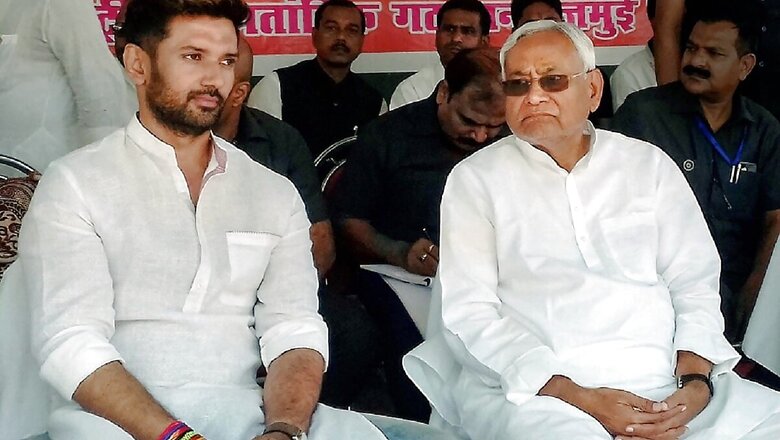
views
Will Chirag Paswan be able to carry forward the legacy of his father late Ram Vilas Paswan by steering the Lok Janshakti Party (LJP) to electoral successes in Bihar and other states? Or, will his party’s political existence of 21 years come to an end in the face of the onslaught launched by his bête noire, Nitish Kumar?
Given the frequency of exits by senior party workers after the LJP’s dismal performance in the 2020 Bihar assembly elections, it would be a major challenge for Chirag Paswan to contain the current spell of desertions and rejuvenate the party as a potential political force in the state.
Chirag will have to effectively counter the onslaught of the Janata Dal (United) leader and, at the same time, strike up cordial relations with the Bharatiya Janata Party (BJP) to stay relevant in the National Democratic Alliance (NDA). If the electoral losses in Bihar are not compensated in other states, the LJP might forfeit the ‘bungalow’ symbol allotted to it.
The LJP received a major jolt when its lone MLC Nutan Singh joined the BJP. Her husband Niraj Singh Bablu is a minister from the BJP quota in the Nitish Kumar government. Her switchover triggered gossip in the party circles with leaders wondering whether Chirag had lost the affection of Prime Minister Narendra Modi, whom he had compared with Lord Ram and himself with Hanuman during the Bihar assembly elections.
Speculation was also rife about the likely switchover of the party’s lone MLA Raj Kumar Singh to the JD(U) after he met Nitish Kumar early this year. However, Singh has not made any commitment to the ruling party so far. In case, it happens, the LJP will have zero presence in the bicameral Bihar legislature.
The LJP also suffered a huge loss recently when over 200 members of the party joined the JD (U) and an almost equal number of panchayat-level functionaries of West Champaran embraced the BJP. The deserters accused Chirag of becoming a ‘puppet’ in the hands of a coterie of leaders and alleged that there was no internal democracy in the party.
Political circles are also agog with speculation that the six-member parliamentary party led by Pashupati Kumar Paras, younger brother of Ram Vilas Paswan, is also unhappy with the style of functioning of Chirag Paswan. However, Paras has not yet publicly expressed disenchantment over his neglect within the party by his nephew.
Soon after the declaration of poll results, Chirag had dissolved the state working committee and the district units on December 5, 2020, to save the party from a split. But the LJP chief has not been able to appoint new functionaries even after a lapse of over two months now.
Insiders claimed that the LJP chief is trying to shed the tag of ‘brothers’ party’ and give the command of the state unit to a prominent leader from among the Bhumihar, Kushwaha or Rajput communities. As a short-term measure, Chirag has appointed Raju Tiwari and Sanjay Paswan as state working president and principal general secretary respectively.
This exercise is aimed at broadening its social base and giving credence to the LJP as a true champion of the ‘Bihar first, Bihari first’ motto coined before the 2020 assembly polls. Chirag has also planned a ‘Dhanyavaad Yatra’ to express his gratitude to the people for getting approximately 24 lakh votes in the assembly elections. He wants to expand it to 1 crore votes in the state.
However, the LJP is gradually losing its credibility due to uncertainty over the inclusion of Chirag or any other MP in the union council of ministers in place of Ram Vilas Paswan. The BJP did not consider anyone from the LJP to fill the Rajya Sabha vacancy created by Paswan’s death. Instead, it nominated Bihar leader Sushil Kumar Modi to the House.
The ambiguity of the BJP leadership over the induction of any member of the LJP is mainly due to the strong opposition of the ruling JD(U), which holds the LJP solely responsible for its electoral losses in the Bihar assembly elections.
Chirag, who was given the party’s baton by his father a year ago, started asserting himself in Bihar politics, much to the discomfiture of Nitish Kumar. He declared that the LJP wants Nitish to lose the elections and eventually walked out of the NDA. Then, it was considered that Chirag had the tacit support of the BJP leadership.
The LJP harmed the JD(U) beyond expectations as it polled more votes than the margin between the winning candidate and the loser in as many as 38 assembly seats. Had the LJP been part of it, the NDA would have won with a two-thirds majority.
Though the enmity inflicted damage to the JD(U), the LJP too has suffered a huge loss of trust and credibility. Chirag needs to adopt a ‘survival path’ and deal with the allies with political expediency instead of embracing a stubborn attitude.
Chirag should take lessons from his father, who had faced many twists and turns by swinging between self-driven parties for decades. Annoyed with the vacillations among the socialist-strain of political parties and their re-grouping every alternate year, Ram Vilas Paswan launched the Lok Janshakti Party in November 2000 after breaking away from the-then Janata Dal.
Paswan nourished his political outfit into an important political player in Bihar by virtue of his steady support of nearly 8 per cent of the popular vote among the Scheduled Castes especially the Dusadh (also called Paswan) and some extremely backward castes (EBCs). This vote base made him a key political player and he made use of it with remarkable political expediency.
The LJP made its first foray into electoral politics in the 2004 Lok Sabha elections in alliance with the Rashtriya Janata Dal (RJD) led by Lalu Prasad and Congress as part of the UPA. The LJP won four seats while the RJD-led alliance won a total of 33 out the 40 Lok Sabha seats in Bihar.
But in the two successive assembly elections held in February and October 2005, Paswan fought alone. In February 2005, it was a hung assembly and the LJP had the key to government formation with 29 seats. However, Paswan chose not to support either the BJP-led NDA or the RJD-Congress combine, leading to imposition of President’s rule in Bihar. In October, the LJP fielded its candidates in 203 seats but could win only 10 seats.
The LJP fought the 2009 parliamentary polls along with the RJD and Samajwadi Party as a third front. It was a disastrous move as the LJP could not win any seat while the RJD could win four seats. At the same time, it suffered another jolt when its entire Jharkhand unit merged with the Congress.
In alliance with the RJD, the LJP could win only three seats in the 2010 assembly elections but it garnered 6.75 per cent votes. However, two of its MLAs later joined the JD(U) in 2011.
After a lapse of 12 years, the LJP joined the NDA bandwagon again in 2014 and won six of the seven Lok Sabha seats it contested. However, in the 2015 assembly elections, the LJP contested 40 of the 243 assembly seats but could win only two.
Going by its swinging electoral fortunes, it appears that ideological variations, political opportunism and priority for family members hindered the influence of Ram Vilas Paswan in other states like Uttar Pradesh, Rajasthan, Maharashtra and Punjab. Though the Senior Paswan was predicted as a potential Dalit Prime Minister by VP Singh, he was upstaged by the Kanshiram-Mayawati duo in the north-western part of the country.
Chirag has planned to make electoral forays into West Bengal and Assam but it will be safer and wiser for him to overcome the unhealthy rivalry and deal with allies with pragmatic politics. Else, his ‘Bungalow’ will have no inmates in the long run.
Read all the Latest News, Breaking News and Coronavirus News here




















Comments
0 comment